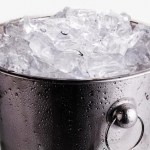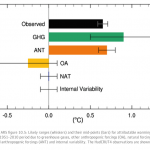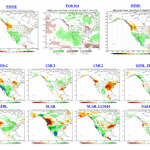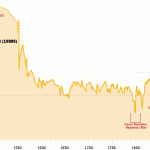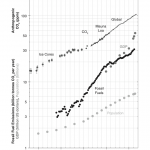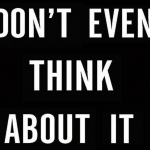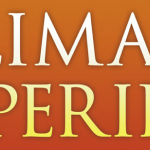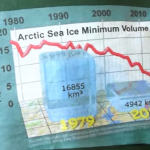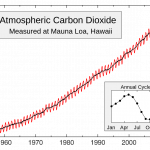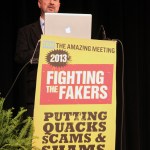Climate Change
I am going to try to keep all the climate science ice bucket challenges here as they occur. At present there are quite a few individuals who have not yet answered the challenge. I'm sure they will. Some of them, in the Northern Hemisphere, may be waiting for it to get colder so the act becomes more meaningful.
Anyway, here's what we've got now. If I'm missing someone, please add a link in the comments!
It all started with Andy Lee Robinson "Arctic Sea Ice Death Spiral" challenge...
Andy donates to the Dark Snow Project and the Climate Science Legal Defense Fund, challenges David Rose,…
Not really a fully fledged blog post, just a quick link pointing you to something interesting.
More than 100%? Sounds funny, doesn't it? Let me rephrase. Humans have caused so much climate change that some of the climate change changed some of the climate back.
Still sounds kinda funny.
OK, try again: Humans have caused a whole bunch of global warming. Nature has caused a small amount of global cooling, which has offset a little of the human caused global warming. But also, humans have caused a little bit of global cooling as well.
Make sense? OK, look at this graph:
I'm sure you've…
In a recent Wall Street Journal article, Steven Koonin, former Department of Energy Undersecretary and BP scientist makes the case that global warming is caused by humans, important, that we must do something about it, and that further research on key topics is necessary to help guide policy.
He states,
The crucial scientific question for policy isn’t whether the climate is changing. That is a settled matter … We know, for instance, that during the 20th century the Earth’s global average surface temperature rose 1.4 degrees Fahrenheit.
Nor is the crucial question whether humans are…
Yes, yes, we hear it all the time: More CO2 is good because plants love CO2
That is a rather dumb thing to say for a number of reasons; nature is not simple. You don't change one variable and expect other variables to respond as though we were turning a garden hose up or down. For example, while plant growth might be enhanced with more CO2 in the atmosphere, there is no reason to think this would be linear, or similar across all plants. You have to dance with the one who brung ya. The plants we have are the plants that have been under Darwinian selection optimizing growth and maintenance…
The Polar Vortex hurt. We who lived in it, through it, with it, are like farm animals that got zapped by the electric fence a couple of times ... notice all that long grass growing by the fence. Stay away. It hurt! So we are worried that this will happen again.
It is a reasonable worry, from a scientific point of view. The Polar Vortex visitation last winter was the result of changes to trade winds and jet streams that has characterized our weather for the last few years. One of the big questions on my mind is this: Are wavy jet streams and corresponding changes in the distribution of…
The Open Atmospheric Society
Climate science pseudo-skeptic Anthony Watts recently bought and registered the domain "theoas.org" and has just announced the formation at that Internet address of a new society explicitly designed to organize people in meteorology and related areas intent on opposing the scientific consensus on climate change. And yes, there is a scientific consensus on climate change.
Dr. Roy Spencer once said to me that trying to organize climate skeptics would be like “trying to herd cats”. While this Society is not trying to “herd” anyone, nor is it specifically focused on…
Check this out:
PennFuture is hosting a Twitter chat with renowned Penn State climate scientist (and our good friend!) Michael Mann aka @MichaelEMann on Wednesday, September 17, from 2pm-3pm EDT. Use the hashtag #AskDrMann to participate. You won't wanna miss it!
Mann has been at the forefront of the climate change conversation over the past decade, from his widely-recognized research to his many media appearances explaining the science behind global warming.
He recently penned an op-ed in the Allentown Morning Call, where he urged the public to become more involved in the climate debate,…
According to data just updated by NASA, last August was the warmest August for the entire instrumental data record, which begins in 1881. This has been something of a mixed year but overall warm. Of the 134 years for which there are data, the coolest month this year so far was February, at 17th place, with July also being cool, at 11th place. Keep in mind this is over 134 years. For the months of January through August, there are no one-digit ranks (1 through 8) prior to 1989, inclusively, and you don't really start getting consistent "top ten" ranks until 1998.
Monthly ranks so far this…
Did you ever read a textbook on economic history, or an in-depth article on the relative value of goods over the centuries expressed in current US dollars? Have you ever encountered a graphic that shows long term trends in rainfall patterns or other climate variables, using a couple of simple lines, designed to give a general idea of relative conditions during different eras? Here are a few examples of what I'm talking about.
This is a graphic made by a major investment firm culling information from dozens or perhaps hundreds of sources into a single graphic. This is the graphic as it was…
Climate Smart & Energy Wise: Advancing Science Literacy, Knowledge, and Know-How by Mark McCaffrey is a book written primarily for teachers, to give them the information and tools they need to bring the topic of climate change effectively to their classrooms. It addresses the Climate Literacy and Energy Literacy frameworks, designed to guide teaching this important topic.
The book provides basics on climate and energy, approaches to teaching about climate and energy, and of special interest for teachers, syncing the topics with existing standards. The main point of the book is to get…
Climate change is emotional, especially when the effects are disastrous and people's lives are ruined. It is vague, sometimes. For example, bad weather happens and always has happened, so an increase in frequency or severity of bad weather isn't necessarily qualitatively novel, and can be hard to put one's finger on. Although the negative effects of climate change are already here, more serious effects are in our future. So, climate change has a component that is mysterious and hard to relate to, because it is in the future. Climate change is global, but spotty on a given day or in a given…
According to John Berger, author of the newly released book Climate Peril: The Intelligent Reader's Guide to Understanding the Climate Crisis, time is running out. The climate is changing in ways that will bring unwanted results, and we as a species are slow off the mark to do something about it.
Climate Peril: The Intelligent Reader's Guide to Understanding the Climate Crisis begins with a description of the global climate in the not too distant future, 2100. It is of course a guess, perhaps fiction. But Berger's description of the world in 2100 is plausible, and much of it probable. We…
This is a big thing. Starting just now, 97 different top experts on climate change, starting with Michael Mann (author of this book), one per hour, will have a say about the consensus. This is being run by Skeptical Science.
From Dana Nuccitelli's post at The Guardian,
Research has shown that when people are aware of the expert consensus, they’re more likely to accept the fact that humans are causing global warming, and also more likely to support taking action to address the problem. Hence the consensus gap is a significant roadblock preventing us from tackling global warming.
To help…
This is Andy Robinson of the Sea Ice Graphics
Put up or ... dump water on your head!
This is not a peer reviewed meta-study, but a meta-study nonetheless. Reuters has engaged in a major journalistic effort to examine sea level rise and has released the first part (two parts, actually). It is pretty good; I only found one paragraph to object to, and I'll ignore that right now.
There are two reasons this report is important. First, it documents something about sea level rise that I've been trying to impress on people all along. The effects of sea level rise do not end at one's perceived position of a new shoreline. Here's what I mean.
Suppose you are standing on a barrier…
The Keeling Curve is the measurement of CO2 in the Earth's atmosphere. As we burn fossil fuel or damage "Carbon sinks" we increase that number. The Keeling curve is at the root of much of the science of global warming. It goes up over time because of the release of fossil Carbon, and it wiggles up and down at shorter time scales for other reasons. For example, the curve drops during the Northern Hemisphere summer because the plants on the north side of the globe take in some of the CO2 and make it temporarily into plant tissue. During the northern winter the reverse happens. (There is a…
The climate change documentary, "Years of Living Dangerously" was nominated for two Emmy Awards. That was well deserved and fantastic news. But, frankly, with Cosmos also nominated for the same categories, no one really expected more than the nomination.
But, while Cosmos dis win in the "Outstanding Writing For Nonfiction Programming" category, and good on them for doing that, "Years of Living Dangerously" took the award for "Outstanding Documentary or NonFiction Series.
This is of course because it is a great, well done documentary. But I like to think part of this outcome has to do with…
I just realized that the Electronic Frontier Foundation has filed a brief with the court in relation to Mann vs. the Competitive Enterprise Institute, the National Review, Mark Steyn, and Rand Simberg (variously). This is disappointing and will probably color my opinion of EFF going forward on whatever else they do. Their brief isn't just ethically wrong, or something I disagree with. It is unintelligent and poorly considered. They simply got it wrong, as though they did not know anything about the law suit. It is embarrassing.
I wonder how they got talked/roped into this? I would really…
Larry Clifton has suggested that Michael Mann’s law suit against the Competitive Enterprise Institute, the National Review, Mark Steyn, and Rand Simberg is ruining it for everyone, and a lot of his right wing conservative friends agree. But they are all wrong, so wrong that one wonders how they could be so wrong. It smells to me like willful ignorance.
This is Michael Moore. For a while, Clifton had a picture of Michael Moore instead of Michael Mann on his Digital Journal post. Made me laugh.
For people who spend most of their time whinging about how other people are ruining the…

